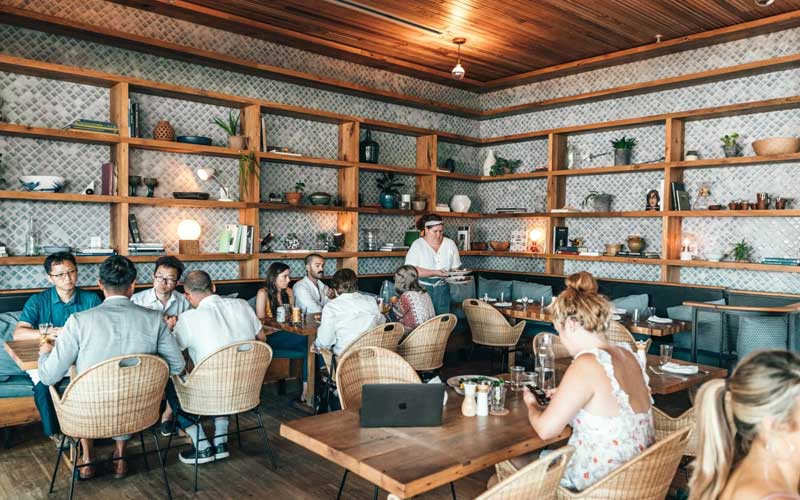
What’s in a name?
A good restaurant name should reflect your concept, your food, the vibe of your venue and your values. First impressions count, and in many cases, your restaurant name will be the first aspect of your venue that customers will encounter.
But how do you choose a name for your restaurant, and is there a certain process you should follow?
In this article, we’ll explore the different things you should consider when picking a restaurant name and tips for finding the best name for your restaurant.
Let’s dive in.
- How to name a restaurant
- What to consider when choosing a restaurant name
- Changing your restaurant name vs naming it for the first time
- Restaurant naming tools
Opening a restaurant?
Download our free costing template that covers all essential costs, from securing your location to opening your doors.
How to name a restaurant
While naming your restaurant might initially seem like a quick and easy process, there’s a lot more to consider than simply picking something that sounds cool. As you shortlist potential restaurant names, it’s important to make sure your ideas reflect your values, location and target customers, as well as being memorable, descriptive and reflective of your brand.
As you brainstorm potential restaurant names for your venue, keep the following in mind.
Keep it simple
If your restaurant name is too difficult to remember, say, or spell, you’re going to miss out on a lot of word-of-mouth marketing, and it will be harder for folks to find you in online searches or on social media.
Evoke emotion
Some of the best restaurant names evoke some kind of emotion in their guests; it could be nostalgia, love or laughter. Choosing a name that evokes a positive emotion will help to create a positive association with your restaurant, making you more memorable.
Do your research before committing
It’s important to avoid restaurant names that have already been trademarked. Do a quick search of trademarked business names by using IP Australia’s trademark search tool. This is also where you’ll register your own restaurant name’s trademark.
Consider a focus group
Run your shortlist of restaurant names by a small focus group to get feedback and opinions. Using a focus group will allow people to highlight any potential issues or concerns with certain restaurant names that you previously might not have thought of.

What to consider when choosing a restaurant name
With the above guidelines in mind, it’s time to get into the fun part – choosing your restaurant name.
To help you get started, consider the following points to help spark your imagination and point you in the right direction.
Take inspiration from your mission statement
Your restaurant mission statement is an expression of who you are and what values you hold, so your restaurant name should be an extension of those beliefs by epitomising what your business stands for.
Take Corretto and Bluebonnet Barbecue, for example.
Taking its name from an Italian caffeinated alcoholic drink consisting of espresso and a small amount of liquor, Corretto aims to live up to its namesake. Offering coffees and cocktails all day long, Corretto has established itself as an all-day drinking and dining spot in Sydey’s Northern Beaches.
Named after the state flower of Texas, Bluebonnet Barbecue aims to give the people of Melbourne a delicious, authentic Texas Barbecue experience – specialising in Texas-style smoked BBQ meats and offering an extensive collection of over 100 Ryes, Bourbons and American Whiskeys.
Incorporate your location into your restaurant name
Using part of your restaurant’s location in your name, such as the street name or number, neighbourhood or another landmark, is memorable and will help guests remember exactly where you’re located.
Kepos Street Kitchen, located on the corner of Kepos Street in Sydney’s Waterloo, is a great example of how to incorporate a location into a restaurant’s name.
Make it humorous
A humorous restaurant name could include a pun or play on words – such as the Australian quick service restaurant Lord of The Fries.
While a funny restaurant name won’t suit all types of restaurants, it can work for some venues. If you want to go this route, definitely test your idea out with a variety of different people to see how it lands. If it seems to flop with most people, head back to the drawing board.
Feature your food
If you want to make it abundantly clear what your restaurant is about, feature your cuisine or main dish in your name, so potential customers know exactly what to expect.
With Belles Hot Chicken, you immediately know what type of food you’re going to get at the restaurant, and the menu features a range of different fried chicken dishes. Similarly, The Pickle & The Patty aptly describes it menu offering – burgers and a range of homemade pickles.
Include a touch of history
If your restaurant is located in an interesting or historic building, consider tipping your hat to the building’s previous history or purpose.
Noun, in Sydney’s Green Square, is a cafe by day and a bar/restaurant by night. It’s located in part of the Green Square library building, and the name Noun clearly pays homage to its bookish surroundings.
Research language and culture
If you’re serving a particular type of cuisine, research the language and culture behind the food to see if there’s potential for a restaurant name.
Xenia Bar & Dining, for example, is aptly named after the Greek concept Xenia, which means hospitality and generosity shown to those who are far from home. When you dine at Xenia Bar & Dining, that’s exactly how the team want you to feel – welcome and part of the family.
Other things to consider
There are so many aspects to draw inspiration from when deciding on a restaurant name – many of which we’ve touched on above. However, if you’re still struggling the find the perfect name, consider these tips to help narrow down your options.
- Keep it short, simple and catchy
- Make it unique
- Appeal to your target audience
- Capture essence of your restaurant
- Research competitor restaurant names

Changing your restaurant name vs naming it for the first time
While it might seem like the exact same process, there’s much more to consider if you’re renaming your restaurant rather than choosing a name for the first time. For those just starting out, you have a lot more freedom because everything is still being defined and will all be new to your customers.
Restaurants that are already in the game have their existing reputation and customer base to think about. As you consider what your new name will be, make sure that you aren’t taking your restaurant’s new name in a direction that will alienate your current customers or will clash with the reputation you’ve worked hard to create.
What this means is, don’t give your place a fancy name if it’s known around town as the best dive bar in town. Likewise, don’t choose a new name that makes it seem like the change comes with an increase in price if your affordability is what brings people through the doors.
Restaurant naming tools
If you’re still struggling to find the perfect restaurant name, there are lots of online tools available to help fire up your inspiration. Here are some of our top picks.
- Wix name generator – simply type a word or two you want in your restaurant’s name, and the tool will instantly generate a list of restaurant name ideas.
- Business name generator – enter a few words that encapsulate your restaurant’s food or theme into the generator, and the tool will create a list of name suggestions for your to choose from.
- Namify name generator – enter at least two keywords (e.g. vegetarian pizzeria), and the tool will automatically generate a list of restaurant name suggestions.
Deciding on a restaurant name
Naming your restaurant is one of the more important creative branding decisions you will make. It’s the centre of your brand, how guests identify you and a part of what initially piques peoples’ interest in your restaurant.
Choose your restaurant name carefully, and be sure to enlist a trusted group of people to workshop your options – after all, it’s an important decision that you will have to commit to for a long time into the future.

News you care about. Tips you can use.
Everything your business needs to grow, delivered straight to your inbox.


